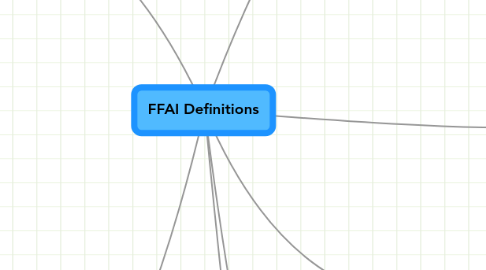
1. important concepts
1.1. "mental task"
1.1.1. mental: "of or pertaining to the mind"
1.1.2. mind: "the totality of conscious and unconsciious mental processes and activities"
1.1.3. thank you dictionary!
1.2. economics
1.3. game theory
1.4. self-awareness
1.5. episodic memory vs skill learning
1.6. conscious vs subconscious behaviors
1.7. emotional vs rational behaviors
1.8. goals, preferences, drives
1.9. rationality
1.10. bounded rationality
1.10.1. incomplete information
1.10.2. limited compute resources
1.11. performance vs competence
2. SETI signal detection
2.1. The search for extraterrestrial intelligence also provides us with an interesting test case for defining intelligence.
2.2. What kind of radio signal is likely not of random or physical origin?
2.3. Complex, non-repeating sequences?
2.4. Certain mathematical progressions, like prime numbers?
2.5. 2D image transmissions?
3. definitions of intelligence
3.1. dictionary
3.1.1. capacity for learning, reasoning, understanding, and similar forms of mental activity; aptitude in grasping truths, relationships, facts, meanings, etc.
3.1.2. manifestation of high mental capacity
3.1.3. the faculty of understanding
3.1.4. from Latin: "intelligere" - to choose between
3.2. other "definitions"
3.2.1. most of these people developed IQ tests or had something to say about it
3.2.2. Alfred Binet
3.2.2.1. Judgment, otherwise called "good sense," "practical sense," "initiative," the faculty of adapting one's self to circumstances ... auto-critique.
3.2.2.2. 1857-1911 (French) Paris
3.2.2.3. First "intelligence test" (1911)
3.2.3. Cyril Burt
3.2.3.1. Innate general cognitive ability
3.2.3.2. 1883-1971 (British) University College, London
3.2.3.3. Studies on the heritability of intelligence.
3.2.4. Howard Gardner
3.2.4.1. To my mind, a human intellectual competence must entail a set of skills of problem solving — enabling the individual to resolve genuine problems or difficulties that he or she encounters and, when appropriate, to create an effective product — and must also entail the potential for finding or creating problems — and thereby laying the groundwork for the acquisition of new knowledge.
3.2.4.2. 1943- (American) Harvard
3.2.4.3. Theory of Multiple Intelligences
3.2.5. David Wechsler
3.2.5.1. The aggregate or global capacity of the individual to act purposefully, to think rationally, and to deal effectively with his environment
3.2.5.2. 1896-1981 (American) Bellevue Psychiatric Hospital
3.2.5.3. Wechsler Adult Intelligence Scale (WAIS)
3.2.6. Robert Sternberg
3.2.6.1. Goal-directed adaptive behavior
3.2.6.2. 1949 (American) Oklahoma State
3.2.6.3. over 1000 articles on intelligence and creativity
3.3. but what is...
3.3.1. learning
3.3.2. judgment
3.3.3. practical sense
3.3.4. problem solving
3.3.5. abstract thinking
3.3.6. memory
3.4. We'll talk about this more throughout the course.
4. who studies it?
4.1. psychology
4.2. cognitive science
4.3. artificial intelligence
4.4. philosophy
4.5. neuroscience
4.6. sociology
4.7. economics
5. why does it matter?
5.1. Humans are different from animals. The difference is commonly thought of as "intelligence". What is that difference?
5.2. "Intelligence tests" are used widely to predict success in certain professions.
5.3. If we want to build machines with the same capabilities as humans, we need to understand what we are trying to build (just like any engineer).
6. capabilities of intelligent systems
6.1. logic
6.1.1. classical view of intelligence
6.1.2. predicate logic
6.1.3. deduction and induction
6.1.4. trying to explain all of human intelligence through logic falls flat
6.1.5. common trope in SciFi ("Mr. Spock")
6.1.6. limitations of logic
6.1.6.1. fails to take into account randomness (but logic is a special case of Bayesian probabilistic reasoning)
6.1.6.2. computations can be very expensive, so the brain may not be able to carry them out
6.1.6.3. traditional logic doesn't deal well with time, incorrect information, belief, etc.; AI has developed more complex "logics"
6.1.6.4. where does it come from? Is it hard-wired? How?
6.2. problem solving
6.2.1. Generically: given some start state and some constraints, reach some goal state.
6.2.2. When it is a mental process, it is often the same as "planning".
6.3. planning
6.3.1. Solve the problem mentally before solving it physically, since physical exploration is more costly than mental exploration.
6.3.2. Long term planning involves decision making about probabilities, expectations, and risks, as well as preferences.
6.4. learning
6.4.1. Retain past experiences and apply them to new situations.
6.4.2. There are two fundamentally different kinds of learning
6.4.2.1. episodic memory
6.4.2.2. skill learning
6.4.3. You can lose episodic memory while still retaiing skill learning.
6.5. symbolic communication
6.5.1. Transform complex physical realities into a stream of symbols, and back.
6.6. perceiving
6.6.1. recognize objects in 3D scenes
6.6.2. recognize objects from the sounds they make
6.6.3. identify objects by touch or smell
6.6.4. understand spoken language
6.7. acting
6.7.1. produce spoken language (far more complex than playing the piano!)
6.7.2. walk upright (small errors mean death)
6.7.3. handle and manipulate tools
7. assumptions about "intelligence"
7.1. innateness
7.1.1. it is something you're born with, unlike knowledge or specific skills that you can learn
7.1.2. Like "CPU power" or "memory capacity" of a computer.
7.2. task independent
7.2.1. it is some identifiable factor that affects performance on many mental tasks
7.2.2. "idiot savants" are not considered intelligent, even if they are good at some specific mental tasks
7.2.3. this has been challenged by the theory of "multiple intelligences"
7.3. definition or assumption?
7.3.1. we can use "innateness" and "task independence" as defining properties of "intelligence"
7.3.2. "Intelligence is a quantiative measure of an innate quality that increases performance on [a wide range of unrelated] mental tasks."
